#一剪梅·红藕香残玉簟秋
Explore tagged Tumblr posts
Text
A Sprig of Plum Blossom
I'm going to start posting some of my poetry translations here! I'm not sure if I'll post notes in detail at any point, but I wanted to share what I have so far! I'm working on my Chinese, so some parts may not be completely accurate but ah well, it's fun!
一剪梅 李清照 〔宋代〕 红藕香残玉簟秋。轻解罗裳,独上兰舟。云中谁寄锦书来?雁字回时,月满西楼。 花自飘零水自流。一种相思,两处闲愁。此情无计可消除,才下眉头,却上心头。
A Sprig of Plum Blossom Song poem by Li Qingzhao Autumnal red lotus root scents the woven grass, I part my skirts gently, step alone to the mast. Who sends gilded words through a sea of cloud? Once the geese's words return, the moon fills West tower like a shroud. As petals wither and fall, the waters still hurry, one kind of yearning, two lives of idle worry. These countless passions take a toll, gone from furrowed brows, yet carved onto the soul.
I've included my reading of both the original poem and my translation. This was a lot of fun!
23 notes
·
View notes
Text
一剪梅·红藕香残玉簟秋 - plum blossom cutting · red lotuses linger in remnants of fragrance
by 李清照 (Li Qingzhao, 1084 -1155)
红藕香残玉簟秋 hóngǒu xiāng cán yù diàn qiū Red lotuses linger in remnants of fragrance; on bamboo mats, jade-like, there is a touch of Autumn.
轻解罗裳 独上兰舟 qīng jiě luōshang dú shàng lánzhōu Slightly parting the light silk skirt, alone, she boards the magnolia-wood boat.
云中谁寄锦书来 yún zhōng shéi jì jǐnshū lái From within the clouds, whose letter for home approaches?
雁字回时 月满西楼 yàn zì huí shí yuè mǎn xī lóu When geese return in their word formation, the moon fills the west storeyed pavilion.
花自飘零水自流 huā zì piāolíng shuǐ zìliú Alone, flowers fall. Alone, water flows on.
一种相思 两处闲愁 yī zhǒng xiāngsī liǎng chù xián chóu A particular yearning in two places, twice the idle sorrow.
此情无计可消除 cǐ qíng wú jì kě xiāochú This feeling which no scheme can dispel,
才下眉头 却上心头 cái xià méitóu què shàng xīntóu was just shed from the brow, yet rises in the heart.
…………………………………………………………………………….
NOTES
F O R M A T So this is another Song Lyric. But it is a song lyric in more ways than one.
《一剪梅·红藕香残玉簟秋》 is a 宋词 (sòng cí) or Song Dynasty lyric by the poet Li Qingzhao. The 词 lyric was a form that came after 诗 poetry. Unlike 诗 though, they are not just poems, but also literally lyrics. Each work has an accompanying melody.
To write a 词 piece, poets must use various poetic meters from fixed pattern forms, using fixed-rhythm, fixed-tone, and line-lengths that may vary based on an original melody also known as tune pattern 词牌 (cípái). The resulting lyrics are sung using that melody. Unfortunately, all of the melodies for these lyrics have been lost to time, though there have been attempts to reconstruct them in more modern times.
The title can usually be read as 《tune pattern title · first line of lyric》 and are often translated as: To the tune of <tune pattern/cipai title>, <first line of lyric>. I didn’t do that here to keep my title short xD
B A C K G R O U N D Or my best guess at it anyway!
In the second year after Li Qingzhao's marriage to Zhao Mingcheng, due to ~political struggles~ between factions from the new court and the previous one, her father Li Gefei was dismissed from office and could only return to his place of origin with his family. Li Qingzhao as his daughter, was also implicated in this as a child of someone in the Yuanyou faction. It was decreed that children of criminal officials of the Yuanyou faction were not allowed to live in the capital, so she had no choice but to separate from her husband and return to her hometown alone to join her parents. This supposedly happened in the Summer of the year 1103, which was a year after their marriage.
As far as I know, this was the only time early on in their marriage that they were separated. So there’s a good chance this work was a result of that period in her life.
P O E M
红藕香残玉簟秋 red lotus / fragrance / remnants // jade / bamboo mat / Autumn
红藕 is an alternate name for the red lotus. A search on gushiju.net, with the field narrowed on Song Dynasty yields 27 poems with the word 藕 in their titles, and at least 15 in which the title is referring to a lotus flower of some sort. 香 can sometimes be used to allude to a flower, but I am leaning towards this one being about the lotus’ fragrance. And then, it is still difficult to see 残 and not think damaged and hence, incomplete. In this case, I suppose it would mean remnants. The remnants of the lotus’ lingering fragrance.
So, the speaker is near a water body. Somewhere where there is enough water and enough lotuses that their lingering fragrance can be smelled. Wikipedia tells me that lotus plants are adapted to grow in the flood plains of slow-moving rivers and delta areas, while Baidu informs me that they live where waters are calm and still, and where there is shallow waters, especially lakes, marshes and ponds. Let’s see where this poem takes us!
Two notes on the lotus: The flowers of lotus plants bloom in the Summer and in the Autumn, they either bud or, having reached the end of their flowering season, fall. I had to google 红藕 the way that I did, because the word 藕 refers to the root of the lotus, which we like very much to eat. It was instantly recognizable as the other half of 莲藕, meaning lotus root. When chopped and cooked in soup, it oxidizes and turns a pale brownish pink colour.
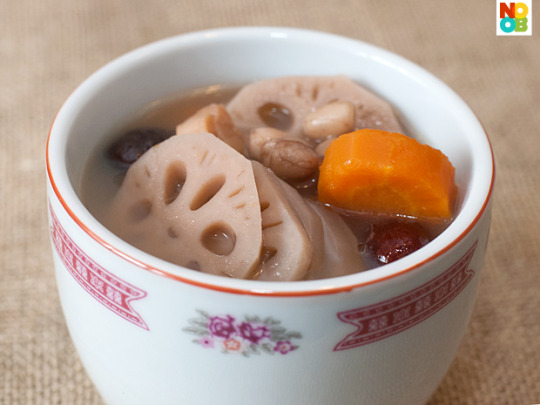
(Source)
While thinking about this, I got curious about how a full lotus plant looks like, and went to google for a picture. This was my first time seeing the full lotus plant, even in illustration. Should really have expected this, but somehow the position of the ‘root’ still surprised me.
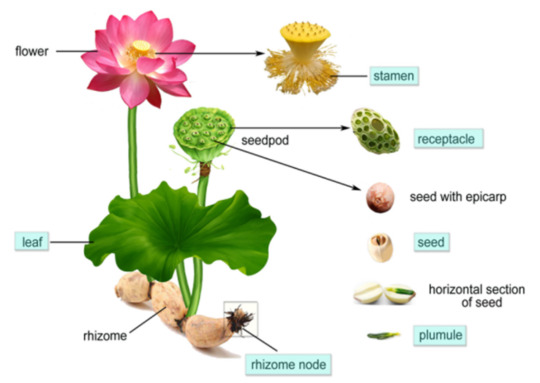
(Source)
A 簟 (diàn) is a mat of woven bamboo usually used for lying on or sitting. It has a cooling effect in the Summer, sort of like the waterbeds of today.
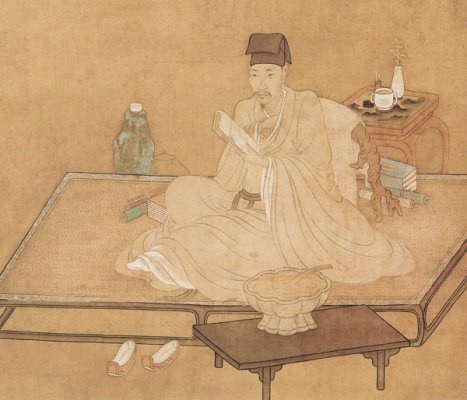
(Source)
The usage of 玉 in 玉簟, is a simile comparing the bamboo mat to jade. This is a way of describing the surface of the bamboo mat, that it has that same lustor and beauty, and that it is very cool to the touch, the way that jade (specifically jadeite as opposed to nephrite) is even at room temperature. Building on that, 秋 feels like an adjective. And yet, 秋 is Autumn. What is going on?
This is a depiction of a scene as felt through the senses. How do we know that there are lotuses wilting? Through the lingering notes of their fragrance. How do we know the season? Through the jade-like chill of the lustrous bamboo mat beneath us and the fading of the lotus’ fragrance. Autumn is here.
轻 / 解 / 罗裳 // 独 / 上 / 兰舟 gently / undoing / silk upper robe // alone / boarded / magnolia-wood boat.
The 解 usage here I thought was 解衣 at first - to take off an article of clothing (which, just FYI dates back to 《战国策》 Annals of the Warring States, edited and compiled by Liu Xiang of the Han Dynasty). And so the line was translated as: gently doffing silk summer robes.
But stealing a bit of time during team building at work (on stone ‘homework’ benches too!) to stare at this poem in my notebook, it suddenly didn’t make sense again… Although Autumn’s chill also explains why it's time to take off summer clothes, especially if you’re getting on a boat since its always colder and windier where there is water, there is quite a bit of an awkward time gap between changing out your summer clothes and getting on a boat!
This was when I concluded that it was TIME TO MOVE ON and look at this entire part of the poem as a whole.
A particular weave of silk fabric, 罗 (luō) is lightweight and very suitable for summer clothes. Here’s an example of a fancier type of it.

Meanwhile, the 裳 (read: shang) is the equivalent of a skirt. Like what the lady is wearing in the photo below.
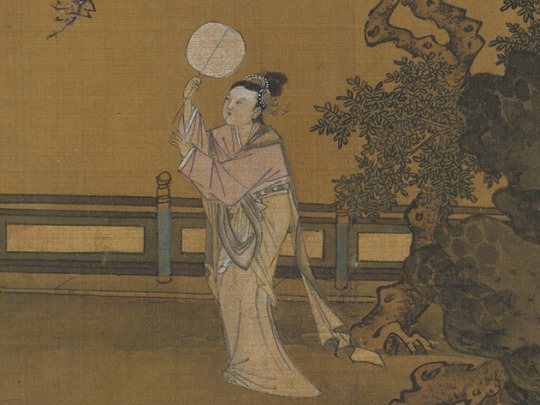
(Source)
兰舟 is actually just a fancier way to say ‘boat’. BUT it can apparently also mean bed, I didn’t manage to find any examples in my quick skim of gushiju, but a lot of dictionaries do say this, so I suspect it may just be rarely used. Its one of the many reasons I’ve been chewing at this line for a while.
The first 兰舟 was a boat made with wood from the magnolia tree by the famous architect, carpenter and engineer Lu Ban of the Zhou dynasty, according to a story in the lower volume of 《述异记》, which was a compilation of supernatural stories from the Northern and Southern Dynasties by Zu Chongzhi. By the way, he had A LOT of hobbies (whoa! see the ss below). This probably makes it the dated version of an urban legend? Anyway.

I do prefer to think the intended meaning was boat, not bed - just taking a moment here to be amused at the pronunciations of 船 (chuán) boat and 床 (chuáng) bed being so close in mandarin xD - because of the previous imagery from the association of lotuses with water bodies and vibe of the scene. The idea or image of 兰舟 in my mind is one that calls up feelings of being adrift and alone. A small little leaf of a boat on a vast lake. ‘Boarding alone’ reinforces that lonely image but also adds a hint of wanting to be on their own. After all, they chose to come here (wherever ‘here’ is).
So then, with the decision that the second half of the sentence will be some variation of ‘boarding the magnolia-wood boat alone’, there were two options for the action with the clothing or skirt in the first part of that sentence.
Deftly remove the light summer silks
Lightly part the silk skirts
Actually, upon first reading the line without pleco or googling, the image in option 1 automatically came up in my mind. But then it came to a screeching halt when she boarded the boat! Knowing that the chill of Autumn is upon us, surely it wouldn’t make sense to be wearing only lightly woven silk clothing and then be disrobing at this time? It makes even less sense to be wearing something light on top of more weather appropriate ones and then taking it off later. And there could be an unspoken step in between 轻解罗裳 and 独上兰舟 of putting on clothes. But that’s just hmmm… unnecessarily complicated.
But 解 doesn’t always mean remove completely. You could just be in the middle of untying a knot partially undoing something or perhaps, by extension, ‘partially disrobing’ via lifting up your skirt. Option 2 was adopted for finally being a mental image I can fully support.
And so, amidst the lingering fragrance of fallen lotus flowers, in the Autumn chill, someone gently parts her fine silk skirts and boards a boat alone.
The next two lines are where you have to activate all your vibe receptors.
云中 / 谁 / 寄 / 锦书 / 来 within clouds / who / sends / letter for home / coming here
雁 / 字 / 回 / 时 // 月 / 满 / 西 / 楼 geese / word / return / time // moon / fills / west / building
(I’m doing these together because they are closely related)
If we follow the narration in this poem, everything after 独上兰舟 is happening in the boat. The speaker is looking up into the sky, where they may be seeing the wild geese setting off on their annual migration. As it is Autumn, this is the right season for birds to be setting off on their long haul flights. Supporting this is the next line which starts with ‘when the geese return in their word formations’ referring to the V (in English) or 人 (in Chinese) shape they tend to fall into when flying as a flock.
Note the word ‘when’ (i.e. x happens 时). This is an imagined situation.

(Source)
Something I found out because I wondered why how birds could be flying when the moon is supposed to be out and vaguely to the West: Geese also continue their migratory flights at night to avoid predation and, to save energy, not be flying when there is turbulence in the air which occurs during the day where there are more thermals.
The 锦书, literally brocade letter, is a word derived from the story of the poet Su Hui, a poet of the Middle Sixteen Kingdoms period (304 to 439) during the Six Dynasties period. After a particularly fierce quarrel with the concubine her husband had brought back from his desert exile, she refused to leave with him to his new post in Xiangyang. Hence, when he finally went, he brought only his concubine along with him, leaving her behind as she had wanted. Soon after, she regretted the decision and embroidered a palindrome poem on silk brocade and sent it to him. This work consisted of over 840 words and could be read in many different ways and directions.
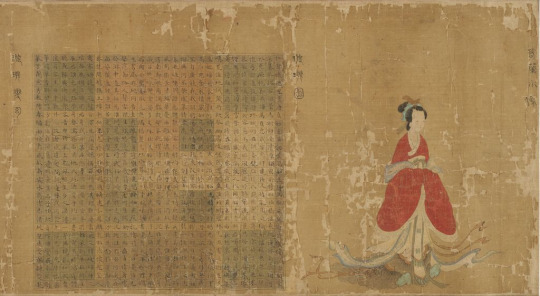
(Source)
The piece impressed and touched him so much that he returned to fetch her with gifts. The term 锦书 has since been used to refer to beautiful letters, usually from wife to husband but sometimes the other way round as well, when they are apart.
The sight of geese in the sky would evoke thoughts of letters from someone far from home. Originating from the story of a loyal diplomat of Han who had been sent as an ambassador to the Xiongnu, and suffered much hardship for it. When it was time for him to return, the Chanyu (Leader of the Xiongnu) pretended he was already dead and refused. Years later, another envoy discovered that he and his men were still alive. To force the Chanyu to release them, someone made up a story that the Emperor of Han had killed a migratory goose while hunting, and that a letter from Su Wu seeking help was found on the bird's foot, whereupon they all got to return home. The association of swan-geese with letters, wandering, longing and hope has only gotten deeper since, and its imagery is used often in literature.
We even have a chengyu for it! 鸿雁传书 / roughly: the swan-goose delivers a letter.
A little note on architecture. Courtyard houses, also known as siheyuan were the traditional type of houses built with a specific layout. The rooms on the West were reserved for the ladies in a family, the East were for the sons and their wives. For a more detailed introduction, do check out this video! The relevant portion starts at about the three minute mark.
Just purely from the position, rooms and buildings in the West side of the house have a good view for sunset and the moon as well. A friend pointed this out, and I was like O.O oh yeah! So it does! Perfect place for ~romance~ and staring longingly out into the distance.
After boarding the boat, she looks up at the sky where there are geese setting off Southwards on their annual Autumn-Winter migration, wondering if she will receive a letter from her husband. She pictures it clearly in her mind’s eye, when they return after Winter, there will be a full moon shining down, and her world will be bright and it will be a time of reunion.
No vibes now. These are all feelings from here on xD
花 / 自 / 飘零 / 水 / 自 / 流 flowers / naturally | on their own / fall // water / naturally | on its own / flows
一 / 种 / 相思 // 两 / 处 // 闲愁 one / type (of) / longing between two (people) // two / places / vain woe
The original translation for the first line was 'flowers fall and rivers flow on, as is their nature', because I thought the line was saying that it is as unaffected and natural for a parted couple to miss each other dearly, helplessly. The pairing of falling flowers and running water has always been an imagery associated with vicissitudes, uncertainty and wandering adrift. And on top of that, falling flowers symbolize the passing of beautiful things, the passage of time, while flowing water is associated with unending sorrows, so these two very aptly express the depth of their feeling and their circumstances.
But I was halfway through doodling this line down when I realised 自 can also be read as ‘on one’s own’. Which means we could also interpret that as the speaker metaphorically comparing the falling flowers to herself and the flowing water to her husband. Even if falling flowers and flowing water allude to wandering unmoored, they are still together. But not anymore. Both are troubled by their separation, but because of this separation, they are feeling it alone. It is the same longing, but because it is in two hearts, two places, it is a sorrow that settles deep and is felt in vain. (yjtc: *mindblown*)
And why is it 闲愁?
此 / 情 / 无 / 计 / 可 / 消除 this / feeling / no / plan / can / utterly dissipate
才 / 下 / 眉头 // 却 / 上 / 心头 just / down (from) / brows // yet / up (in) / heart
There’s nothing that can be done to dispel the love that gives rise to the longing, the sorrow, no clever idea, no cunning scheme can trick it. It almost feels like it is everywhere, around her, within her. The pain may be smoothed from a tightly knit brow, but then it immediately rises in the heart.
Curious about this, on the way to the meetup location for team building on Wednesday, I did a silly little experiment on the bus: First I arranged a short playlist of five songs that never fail to hurt me in order of lightest to worst, then stared out of the window from a comfortable seat, and started to listen. When the words first caused me to tear up, my face scrunched up slightly, involuntarily and the feeling of wanting to cry came from the area of my eyes - obviously, I blinked it away xD Next, briefly, my throat sort of closed up. And finally, there was tightness around my chest and a stabbing feeling in my heart.
I did a quick google consult with Science and they tell me that ‘the link between sadness and physical pain such as heartache has been empirically proven’.
Conclusion: The poet has some excellent observation skills!
Jokes aside, I think it’s amazing that she expresses the killing blow in this poem with such simplicity.
#一剪梅·红藕香残玉簟秋#一剪梅#李清照#li qingzhao#i would love to hear this with the original melody#even if it isn't music as i know it now#i guess we're always curious about the things we cannot have#skgjdkshgk i gave up trying to make it sound like poetry#commentary#poems
45 notes
·
View notes
Text
“千古才女”李清照最经典的十首诗词
李清照(1084年3月13日~1155年5月12日)号易安居士,汉族,山东省济南章丘人。宋代(南北宋之交)女词人,婉约词派代表,有“千古第一才女”之称。
李清照
1《声声慢·寻寻觅觅》
寻寻觅觅,冷冷清清,凄凄惨惨戚戚。乍暖还寒时候,最难将息。三杯两盏淡酒,怎敌他、晚来风急?雁过也,正伤心,却是旧时相识。
满地黄花堆积。憔悴损,如今有谁堪摘?守着窗儿,独自怎生得黑?梧桐更兼细雨,到黄昏、点点滴滴。这次第,怎一个愁字了得!(守着窗儿 一作:守著窗儿)
2《武陵春·春晚》
风住尘香花已尽,日晚倦梳头。物是人非事事休,欲语泪先流。
闻说双溪春尚好,也拟泛轻舟。只恐双溪舴艋舟,载不动许多愁。
3《如梦令·常记溪亭日暮》
常记溪亭日暮,沉醉不知归路。
兴尽晚回舟,误入藕花深处。
争渡,争渡,惊起一滩鸥鹭。
李清照《如梦令》
4《一剪梅·红藕香残玉簟秋》
红藕香残玉簟秋。轻解罗裳,独上兰舟。云中谁寄锦书来,雁字回时,月满西楼。
花自飘零水自流。一种相思,两处闲愁。此情无计可消除,才下眉头,却上心头。
5《如梦令·昨夜雨疏风骤》
昨夜雨疏风骤,浓睡不消残酒。
试问卷帘人,却道海棠依旧。
知否,知否?应是绿肥红瘦。
6《夏日绝句》
生当作人杰,死亦为鬼雄。
至今思项羽,不肯过江东。
7《醉花阴·薄雾浓云愁永昼》
薄雾浓云愁永昼,瑞脑消金兽。佳节又重阳,玉枕纱橱,半夜凉初透。
东篱把酒黄昏后,有暗香盈袖。莫道不销魂,帘卷西风,人比黄花瘦。
李清照
8《渔家傲·天接云涛连晓雾》
天接云涛连晓雾,星河欲转千帆舞。仿佛梦魂归帝所。闻天语,殷勤问我归何处。
我报路长嗟日暮,学诗谩有惊人句。九万里风鹏正举。风休住,蓬舟吹取三山去!
9《清平乐·年年雪里》
年年雪里,常插梅花醉。挼尽梅花无好意,赢得满衣清泪。
今年海角天涯,萧萧两鬓生华。看取晚来风势,故应难看梅花。
10《点绛唇·蹴罢秋千》
蹴罢秋千,起来慵整纤纤手。露浓花瘦,薄汗轻衣透。
见客入来,袜刬金钗溜。和���走,倚门回首,却把青梅嗅。
李清照所作的词,前期多写其悠闲生活,后期多悲叹身世,情调感伤。形式上善用白描手法,自辟途径,语言清丽,你最喜欢的是哪一首?
from http://bit.ly/2DK1t8m
0 notes
Photo

《一剪梅》 李清照 红藕香残玉簟秋。 轻解罗裳,独上兰舟。 云中谁寄锦书来, 雁字回时,月满西楼。 花自飘零水自流。 一种相思,两处闲愁。 此情无计可消除, 才下眉头,却上心头。
0 notes
Photo

红藕香残玉簟秋,轻解罗裳,独上莲舟。云中谁寄锦书来,雁字回时,月满西楼。花自漂零水自流,一种相思,两处闲愁。此情无计可消除,才下眉头,却上心头。——《一剪梅》李清照
0 notes
Text
Thanks for tagging me, @fishylife. I do love doing these and reading your updates!
Favourite colour | Ultramarine as always, but next up maroon has been shunted to third place by powder blue
Currently reading | Oh. A BUNCH of things, nearly all of them works-in-progress on that Chinese webnovel website, JJWXC. Physical book wise though, I’ve been reading 诗书礼乐: 李茀民文化随笔, which is a collection of really charming articles and essays on poetry and music by Prof Lee. It’s changing the way I read Chinese poetry! Also working on reading my way through 唐诗三百首 / Three Hundred Tang Poems.
Last series | 《星汉灿烂》Love Like the Galaxy! I enjoyed it quite a lot. The humor was on point, family drama delicious, and the main character quite delightfully witty. My favourite part of it is the emperor and his epic shipping of the main character and his godson, and BEST of all - how neither of his wives have any respect for him
"You've been together since you both were young. What did you see in him?" "His face."
Last movie in a theatre | Fantastic Beasts: The Secrets of Dumbledore. Good movie. I had one major major issue with a certain creature and how it was used, but otherwise I liked Mads’ performance as Grindelwald plus his scenes with Dumbledore. They have incredible chemistry.
Currently working on | A couple of translations (when am I not though?). Improving my currently atrocious handwriting with a brush. I’m also drafting notes for Li Qingzhao’s 《一剪梅·红藕香残玉簟秋》 as I read it, and hoping to sub Zhou Shen’s 《光亮》 by next week or the week after. That song is taking a while because I’m also trying to watch the documentary episode it was written for LOL.
Tagging: @liberty-or-death, @merelhyn, @decrescendo, @tofufei, @waningcrescentserenade - But only if you want to! Take however long you need :D!
5 notes
·
View notes
Text
诗词 | Poetry
Poems that were not attributed to to being written within a specific year are dated with the lifespan of their writer. If the poet has neither a birth nor death date on record, the dynasty in which they were born will be used instead. All dates are sourced from baidu, 16Jan21 and earlier.
Information on each poem is presented as such:
Poet’s name in pinyin (Poet’s life and death / Dynasty, start and end) | 《Title of collection if any》 Poem title (date it was written, as provided by baidu) - Link to fwoopersongs translation post.
■ Commentary □ Accompanied by images
SHANG - QIN DYNASTY 【1600 - 206 BCE】
Unknown | 《诗经》郑风·子��� (1000 - 600 BCE) - Shijing: Airs of the State of Zheng · His Collar □
Unknown | 《诗经》国风·郑风·山有扶苏 - Airs of the State of Zheng, Mountains Have Leaning Shrubs ■□
Qu Yuan (340 - 278 BC) |《楚辞》 渔父 - Songs of Chu: The Fisherman ■
HAN DYNASTY 【206 BCE - 220 CE】
Unknown | 白头吟 (202 - 8 BCE, Western Han Dynasty) - lament for a wish ■
Kong Rong (153 - 208) | 临终诗 (208) - last words ■□
THREE KINGDOMS 【220 - 265】
Cao Zhi (192 - 232) | 蝉赋 (220 - 226) - Ode to the Cicada
TANG DYNASTY 【618 - 907】
Wang Wei (699 to 759) | 鹿柴 (742-756) - Deer Villa ■
Wang Wei (699 to 759) | 杂诗三首 (755 - 761) - miscellaneous poems three ■□
Li Bi (722 - 789) | 长歌行·天覆吾 - Long Song (Heaven is above)
Liu Yuxi (772 - 842) | 八月十五日夜玩月 - Frolic ‘neath the moon on Mid-Autumn’s night ■
Zhang Jiuling (678 - 740) | 感遇十二首 (737) - sentiments on the road
Li Bai (701 - 762) | 大堤曲 - Song of the embankments
Li Bai (701 - 762) | 独坐敬亭山 (744) - Sitting alone on Mount. Jingting
Li Bai (701 - 762) | 侠客行 (744) - An Ode to Swordsmen ■□
He Zhizhang (655 - 744) | 回乡偶书·其一 (744) - Homecoming, random scribbles (½) ■
Li Bai (701 - 762) | 将进酒 (752) - An Invitation to Drink ■□
Li Ye (730 - 784) | 八至 - Eight Extremes
Du Fu (712 to 770) | 春望 (757) - The View in Spring
Zhang Wei (Tang Dynasty, 618 - 907) | 同王徵君湘中有怀 (758) - With Master Wang in Xiang Zhong, Speaking My Mind ■
Liu Changqing | 送灵澈上人 (761) - Seeing off Venerable Ling Che □
Du Fu (712 to 770) | 春夜喜雨 (761) - Delight at rain on a Spring night ■
Xu Ning (800s, exact date unknown) | 庐山瀑布 - Mt Lu Waterfall □
Yuan Zhen (779 - 831) | 离思·其四 (809) - Thoughts on Parting (Part 4) ■□
Bai Juyi (772 - 846) | 暮江吟 (822) - Sunset over the river, a song ■□
Bai Juyi (772 - 846) | 问刘十九 (772 - 646) - A question for Mr Liu □
Jia Dao (779 - 843) | 寻隐者不遇 - Failing to Meet the Recluse ■
Wen Tingyun (~812 - 866) | 新添声杨柳枝词 - Newly Added Melody to Willow Branch Lyric ■
Wen Tingyun (~812 - 866) | 商山早行 (859) - Morning Departure from Mount Shang ■□
Unknown (Tang, Zhaozhong period, 867 - 904 ) | 三生石上旧精魂 - An Old Soul On the Stone of Three Lives ■
SONG DYNASTY 【960 - 1279】
Li Yu (937 - 978) | 浪淘沙令·帘外雨潺潺 (978) - Waves Washing the Sand (Ditty) · The Sound of Rain Beyond the Windows ■□
Li Yu (937 - 978) | 虞美人·春花秋月何时了 (978) - Lady Yu · Spring flowers, Autumn moon, oh when will they end? ■
Tang Hui (Southern Song Dynasty, 1127–1279) | 八声甘州·摘青梅荐酒 - Eight Melodies of Ganzhou (Pluck the plums to taste with wine) ■□
Lin Bu (967 - 1028) | 山园小梅二首 - Little Plum Blossoms of the Garden in the Mountain (2) ■□
Wang Qi Song (Song Dynasty, 960 - 1279) | 梅 - Plum Blossom ■
Liu Yong (Northern Song, 984 - 1053) 归朝欢·别岸扁舟三两只 - boats on the opposite shore ■
Qian Weiyan (977 - 1034) | 玉楼春·城上风光莺语乱 (1033 - 1034) - Above the city
Su Shi (1037 -1101) | 江城子·乙卯正月二十日夜记梦 (1075) - River Town Melody · A Dream on the 20th Day of the Second Month in the Year Yimao
Su Shi (1037 -1101) | 明月几时有 (1076) - When will the bright moon appear?
Su Shi (1037 -1101) | 定风波·莫听穿林打叶声 (1082) - Still the Wind and Waves • heed not the sound of rain in the forest
Su Shi (1037 -1101) | 题西林壁 (1084) - Written On this Wall in Xilin ■□
Li Zhiyi (1048 to 1117) | 卜算子·我住长江头 (1102 - 1117) - Song of Divination · I live at the Long River’s head ■□
Li Qingzhao (1084 - 1155) | 如梦令·昨夜雨疏风骤 - Song of a Dream
Li Qingzhao (1084 - 1155) | 一剪梅·红藕香残玉簟秋 - plum blossom cutting · red lotuses linger in remnants of fragrance ■□
Li Qingzhao (1084 - 1155) | 满庭芳·小阁藏春 - The Little Courtyard Hides Spring ■□
Xin Qiji (1140 to 1207) | 青玉案·元夕- Green Jadeite Platter · Fifteenth Day of New Year ■□
Lu You (1125 to 1210) | 己酉元日 (1189) - First Day of Ji-You ■
Lu You (1125 - 1209) | Cat Poetry Collection - Lu You and His Cats □
Shi Xinghai (1224 - ?) | 送清上人归苕溪 - Seeing off Venerable Qing ■
JIN DYNASTY 【1115 - 1234】
Wang Liangchen (? - 1218) | 九月七日饮 - seventh day of the ninth month, drinking □
YUAN DYNASTY 【1271 - 1368】
Wang Mian (1310 - 1359) | 徐竹隐 - Seclusion in the Bamboo Forest
MING DYNASTY 【1368 - 1644】
Li Zhishi (Ming Dynasty, 1368 - 1644) | 为何凝生 题十九首其十二 · 浣月池 - for what were we born 2/19 · Moonwash Pool ■
Wang Guangyang (? - 1379) | 画虎 - Tiger painting
QING DYNASTY 【1644 - 1912】
Nalan Xingde (1655 - 1685) | 长相思·山一程 (1682) - longing for home (a journey)
Kuang Minben (1699 - 1782) | 是非审之于己 (1754 - 1757) - On a couplet from the Yuelu Academy ■□
REPUBLIC OF CHINA【1912 - 1949】& AFTER
Fei Ming (1901 - 1967) | 飞尘 (1936) - the flight of dust motes ■
Dai Wangshu (1905 - 1950) | 在天晴了的时候 (1944) - When the sky is clear and sunny □
Xi Murong (1943 - Present) | 回眸 - Look Back ■□
Unknown | 道别 (unknown) - Saying Goodbye
POETRY THEMED SETS
for childhood nostalgia (the first Chinese poems I ever learnt) ■
ART
南洋景色 (1945, Strokes of Life: The Art of Chen Chong Swee) - Nanyang Scenery
25 notes
·
View notes
Photo

一剪梅 宋·李清照 红藕香残玉簟秋。轻解罗裳,独上兰舟。云中谁寄锦书来,雁字回时,月满西楼。花自飘零水自流。一种相思,两处闲愁。此情无计可消除,才下眉头,却上心头。
0 notes